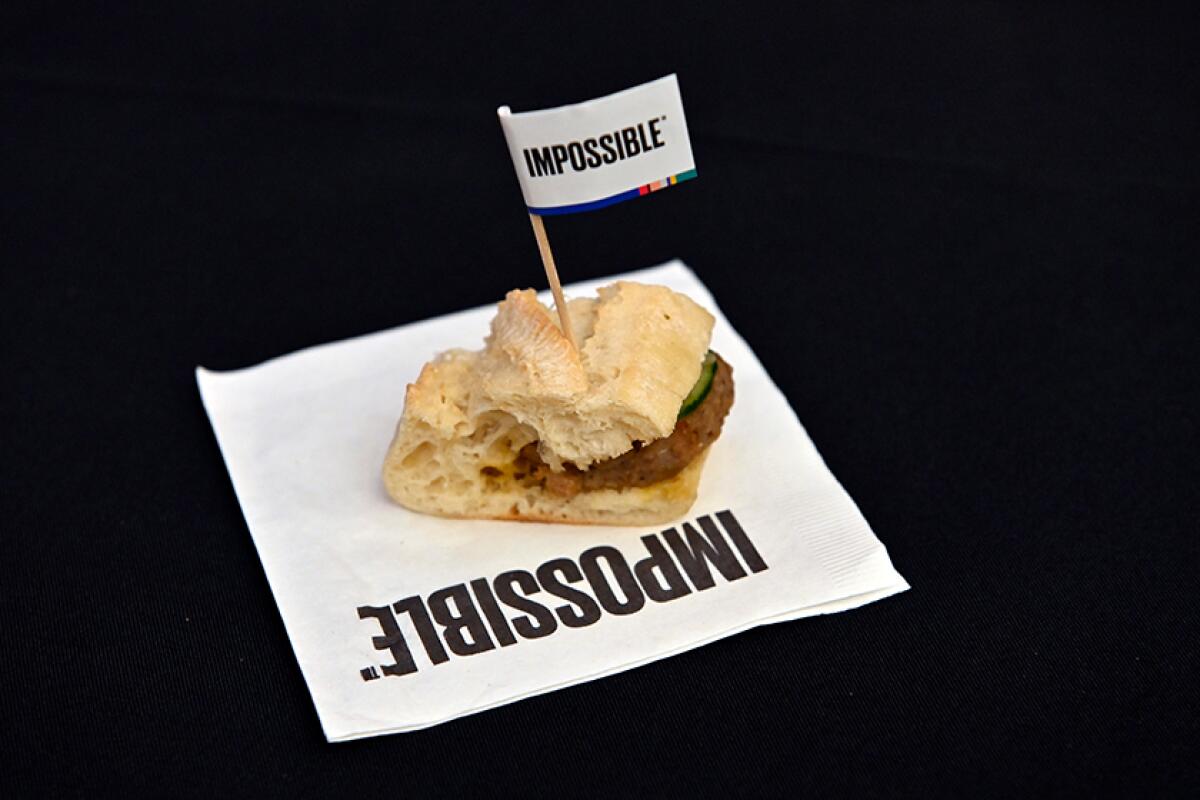The other fake meat: Impossible Foods unveils pork and sausage

After a big year for its plant-based burger, Impossible Foods Inc. has something new on its plate.
The Redwood City, Calif., company unveiled Impossible Pork and Impossible Sausage on Monday evening at the CES gadget show in Las Vegas.
It’s Impossible Foods’ first foray beyond fake beef. The Impossible Burger, which went on sale in 2016, has been a key player in the growing category of vegan meats. Like the burger, Impossible Foods’ pork and sausage are made from soy but mimic the taste and texture of ground meat.
Impossible Pork will be rolled out to restaurants first. The company isn’t yet saying when it will come to grocery stories. Impossible Foods only recently began selling its burgers in stores, although they’re available at more than 17,000 restaurants in the United States, Singapore, Hong Kong and Macao.
Burger King will give consumers their first taste of Impossible Sausage. Later this month, 139 Burger King restaurants in five U.S. cities will offer the Impossible Croissan’wich, made with plant-based sausage coupled with the traditional egg and cheese. Burger King did a similar test of the Impossible Whopper last year before expanding sales nationwide.

The pork products and the Impossible Burger are made in a similar way. Impossible Foods gets heme — the protein that gives meat its flavor and texture — from soy leghemoglobin, which is found in the roots of soy plants. To make heme in high volume, it inserts the DNA from soy into yeast and ferments it. That mixture is then combined with other ingredients, such as coconut oil.
The company tweaked the ingredients to mimic pork’s springy texture and mild flavor. For the sausage, it added spices.
Impossible Pork has 220 calories in a four-ounce serving. That’s not much less than a serving of Smithfield 80% lean ground pork, which has 260 calories. Smithfield’s animal-derived pork has more total fat, at 20 grams, than Impossible Pork, which has 13 grams. But Impossible Pork has far more sodium, at 420 milligrams. Smithfield has 70 milligrams.
But health concerns are only part of the reason that people are eating more plant-based meats. Animal welfare and environmental concerns are also a factor. Nearly 1.5 billion pigs are killed for food each year, a number that has tripled in the last 50 years, according to the World Economic Forum. Raising those pigs depletes natural resources and increases greenhouse gas emissions.
“Everything that we’re doing is trying to avert the biggest threat that the world is facing,” Impossible Foods Chief Executive Pat Brown said.
Brown said the company decided pork should be its next product because customers were frequently requesting it. Impossible Foods started working on the new products about 18 months ago and accelerated development in the second half of 2019.
Brown said ground pork is also key to meeting the company’s international expansion goals. While Americans eat more beef and chicken, pork is the most widely consumed meat worldwide, according to the National Pork Board. People in China eat more than 88 pounds of pork per year, compared with 65 pounds for Americans.
Brown said he believes a product such as Impossible Pork is critical in China, which has limited arable land and relies heavily on imported meat. Last year, Chinese pork prices surged after African swine fever wiped out millions of pigs.
Brown said Impossible Foods is talking to Chinese regulators and potential partners that could make Impossible Pork — as well as plant-based burgers — in China.
“This is a huge opportunity for China in terms of its food security,” Brown said.
Impossible Foods is also waiting for approval from European regulators to sell its products there.
In the United States, 2019 was a breakout year for plant-based meat. U.S. sales jumped 10% last year to nearly $1 billion; traditional meat sales rose 2% to $95 billion in that same time, according to Nielsen.
Impossible Foods rival Beyond Meat — which already sells plant-based sausage links — had a successful public stock offering in the spring. Impossible Foods ran short of burgers in the first half of the year thanks to the buzz from Burger King. After partnering with OSI Group, a food service company, Brown said Impossible Foods produced twice as much of its plant-based meat in the last quarter of 2019 as it sold in all of 2018.
“We have to keep scaling up as fast as we possibly can,” Brown said.
Scaling up isn’t easy. Impossible Foods has stopped trying to become a McDonald’s supplier because it can’t yet produce enough plant-based patties to meet the fast-food titan’s needs, the CEO told Reuters on Tuesday.
McDonald’s already has been testing a sandwich made with Beyond Meat patties, and Beyond Meat shares leaped after the Reuters report was published, closing with a gain of 12.5%.
But Impossible Foods told Bloomberg that the CEO’s remarks were misinterpreted. “Our ambition is to be everywhere,” spokeswoman Rachel Konrad said. “We would never close the door, never abandon a relationship.”
Brown said he welcomes new competitors in the space, including deep-pocketed rivals such as Nestle and Tyson Foods. The meat industry is vast, he said, and plant-based meats are still only around 1% of sales.
His only concern is that plant-based products taste good enough to convince meat eaters to switch.
“A crappy product won’t win over meat lovers,” Brown said.
Durbin writes for the Associated Press.
More to Read
Inside the business of entertainment
The Wide Shot brings you news, analysis and insights on everything from streaming wars to production — and what it all means for the future.
You may occasionally receive promotional content from the Los Angeles Times.










